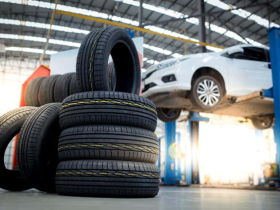One of the most important parts of any car is its tires, which have a direct effect on comfort, performance, and safety. Although most drivers know how important it is to have the right tread depth and tire pressure, tire balancing is frequently disregarded. On the other hand, it is essential for improving ride quality as well as tire longevity. Tire balancing helps stop uneven wear, vibrations, and other problems by equally dispersing the weight of the tire and wheel assembly.
Extended Life of Tires
One benefit of tire balance is longer life. Uneven tire wear can generate bald areas or excessive wear on one side. This reduces tire life and increases car owner costs by requiring early replacement. Balanced tires wear down equally, extending tread life and decreasing replacements.
Improved Riding Experience
Tire balance affects ride quality but is often overlooked. Unbalanced tires can cause seat, steering wheel, and automobile body vibrations. These vibrations can ruin a pleasant drive by causing pain. Balance helps drivers avoid fatigue-causing vibrations and a smoother ride.
Enhanced Safety Elements
Driving safely is of the utmost importance, and tire balancing is essential to preserving a safe driving environment. Imbalanced tires can impair handling, which makes it challenging to properly drive the car. This can be particularly dangerous while negotiating sharp turns or in emergency situations. Longer braking distances are another way that poor balance might increase the danger of an accident. By utilizing Auto Services in Tyler, TX, drivers can ensure their tires are correctly balanced, improving their vehicle’s handling and braking effectiveness, and ultimately enhancing overall safety.
Decreased Fuel Usage
The improvement in fuel efficiency that comes with tire balancing is another important benefit. In addition to wearing unevenly, unbalanced tires can increase the vehicle’s drag. Because of the drag, the engine has to work harder, using more fuel. According to research, keeping tires properly balanced can increase miles per gallon (MPG), which over time can result in significant cost savings.
Plan a Regular Balancing Schedule
It’s critical to have tire balancing done on a frequent basis if you want to profit from it. Every 5,000 to 7,500 miles or whenever new tires are put, experts’ advice balancing tires. It’s also a good idea to think about balancing if the vehicle has been in an accident or if the ride quality has changed. By taking preventative measures, drivers may enhance ride quality and protect their tire investment.
Conclusion
Tire balancing is an important but frequently disregarded part of car upkeep. Vehicle owners can benefit from increased fuel efficiency, a longer tire lifespan, better safety, and a smoother ride by making sure their tires are balanced correctly. To guarantee optimum performance and comfort while driving, regular tire care, including balancing, should be an essential component of any driver’s regimen.







